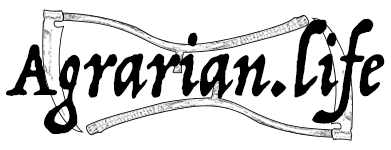It occurs to me that the term “agrarian” may hold very little meaning to most folks living in the West. In a culture where it is normal to source food from global superstores and fast food chains, to work for multinational corporations, and to spend leisure time cloistered before a big screen or traveling far from home, the word may be entirely foreign. Though, I suspect that having found yourself here, you already have an inkling of what I am talking about. The simple definition of an agrarian life is one lived within a land-based, even agricultural, economy.
In the postmodern, neoliberal West, any interest in agrarianism seems, at best, a gross anachronism. How can anyone reasonably think to revert to an agrarian society given the degree of industrialization, urbanization, and globalization we see in the world today? There is no rewind button. There is no undo. And thank goodness. There are many technological and social innovations that have improved the lives and livelihoods of countless people since the Industrial Revolution displaced the agrarian past. Why would anyone want to go back to the days of consumption, diphtheria, and bloodletting?
So then, what could it mean to be an agrarian in the Information Age? There exists no real criterion, no philosophy, no standard to bear. The following list is one attempt to identify what an agrarian life might look like today.
To me, an agrarian life…
…cherishes the labors of life and works to nurture self, family, community, and place.
…cherishes community and the interplay among the members thereof.
…honors family and community above self, for it is through these institutions that identity is born, civility is mastered, and joy is found. …recognizes the role of personal responsibility as the foundation for stewardship of self, of society, and of the world.
…recognizes and serves a higher power, be it Allah, Buddha, Christ, Gaia, humanity, or by any other name. Piety begets humility; humility begets respect; respect is manifest in personal responsibility and concern for ones fellows and place.
…recognizes the economies of life and strives to produce more than consume. For the reverse is the source of exploitation, waste, gluttony, and, ultimately, misery.
…acknowledges the state of the world as it is, and tries to better his/her place therein, utilizing the best tools and practices for that place.
…recognizes the excesses of modern society and abhors the exploitation of human and natural resources to feed such.
…never follows the easy path when it diverges from the road of prudence and right.
…practices his/her trade in a sustainable and responsible manner, giving thought to those that are effected thereby both upstream and down, and those past, present, and future.
…seeks always to leave the place whole and functional for its next comers.
It would be folly to proclaim this list exhaustive or definitive, as I not the expert. Thus, this list is sure to transform.
Given these somewhat arbitrary and personal descriptors of what an agrarian life might look like lived, I’d like to further explore why these things might be desireable. To me, it seems intuitive, but I recognize that my opinion is colored by the singular path my life has covered and a long evolution of thought. Thus, moving forward, this blog will be dedicated to exploring what an agrarian life could look like in the 21st Century, and why one ought to consider it.


No Comments